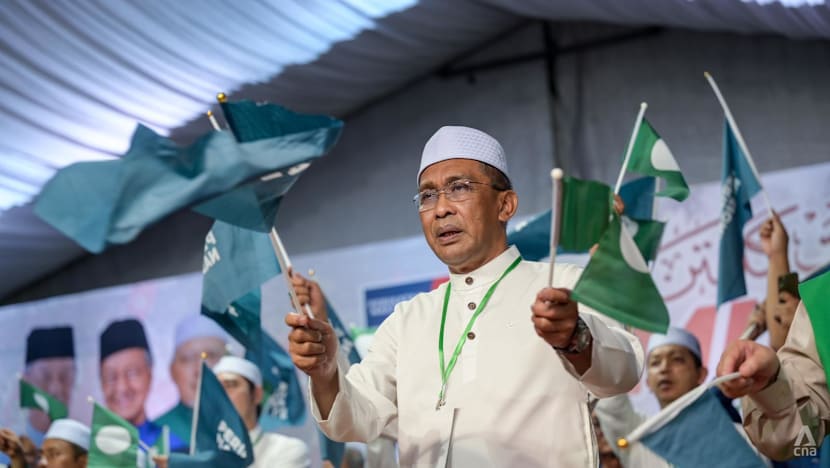Malaysia's Islamist party PAS rejects 'attempt' to cast it as 'bogeyman' in Singapore politics
The party’s secretary-general Takiyuddin Hassan was responding to a statement in Singapore’s parliament by Coordinating Minister for National Security K Shanmugam.

Takiyuddin Hassan, secretary-general of PAS, at a Perikatan Nasional rally at Stadium Mahmud IV stadium in Kelantan in 2023. (Photo: CNA/Fadza Ishak)

This audio is generated by an AI tool.
SINGAPORE: Malaysia’s Islamist party on Wednesday (Oct 15) said it firmly rejects what it called an attempt to cast it as “a convenient bogeyman to advance domestic political agendas in Singapore”.
“Do not manufacture enemies where none exist,” said Parti Islam Se-Malaysia (PAS) secretary-general Takiyuddin Hassan in a statement titled “Singapore, address your domestic concerns, not blame neighbours”.
His comments came a day after Singapore’s Coordinating Minister for National Security and Minister for Home Affairs K Shanmugam delivered a statement in parliament on the politicisation of race and religion.
In his speech, Mr Shanmugam said Malaysian politicians from PAS had urged Singaporeans to vote along racial and religious lines at the May General Election.
Mr Takiyuddin said this was a “false narrative” and that “ordinary cross-border commentary” had been “sensationalised into a security threat for short-term partisan gain”.
He said PAS was committed to respecting national sovereignty, and that this guides all of the party’s engagements which are conducted through proper and formal channels.
“This principle allows us to speak on matters of faith, justice and social wellbeing while ensuring we do not trespass on any country's electoral processes or sovereignty,” said Mr Takiyuddin.
“In return, we expect reciprocal restraint; therefore, do not … weaponise regulatory tools to chill legitimate speech.”
The PAS statement has been reported by several Malaysian news outlets including Utusan Malaysia and Free Malaysia Today.
CNA has reached out to the Ministry of Home Affairs for comment.
IDEAS, OPINIONS CROSSING BORDERS
During Singapore’s hustings, authorities said they had identified foreigners attempting to influence the election, and directed Meta to block online advertising by two PAS politicians.
Their Facebook posts, which can no longer be viewed by users in Singapore, expressed support for certain opposition candidates and criticised decisions made by the ruling government.
Two articles were also published in a PAS newsletter, one of which named several Malay opposition candidates running in GE2025, highlighting their educational and career backgrounds. The other criticised Singapore’s housing policies.
At the time, PAS also issued a statement in response, saying the two individuals were expressing their personal views, which "in no way reflect PAS' official policy or stance". The party added then that while it respects Singapore's concerns, it also believes Singapore's reaction was "somewhat exaggerated and unilateral".
On Tuesday, Mr Shanmugam noted that PAS was an Islamist political party with a goal to Islamise society in Malaysia.
“Does anyone believe that PAS subscribes to Singapore’s multiracial, multireligious model?” he asked, reiterating that PAS had openly supported a political party in Singapore on racial and religious grounds and in the middle of a General Election.
PAS’ Takiyuddin in his Wednesday statement said Singapore positions itself as a “global, hyperconnected hub where ideas and opinions inevitably cross borders”.
“To classify online remarks unaccompanied by funding, actions, coordination or directives as ‘interference’ overstates the case, diminishes the term's meaning and paves the way for censoring legitimate public discourse,” he said.
“If digital connectivity is viewed as a channel for interference, then the only logical response would be to disconnect from the world, which is an unsustainable position for an open economy reliant on flows of capital, talent and information.”
Mr Takiyuddin added that it was “disingenuous” to suggest that Singaporean voters were “so easily swayed” by foreign views that they must be "protected" from opinions which they can evaluate critically.
“Blaming outsiders for internal debates is a classic political deflection tactic that conveniently shifts the focus away from difficult domestic issues,” he said.
He said this allows leaders to rally the public against “a fabricated threat”, which is easier than crafting policy, building consensus and addressing the actual concerns of citizens.
“It is a political shortcut that trades long-term problem-solving for short-term unity against a scapegoat,” said Mr Takiyuddin.















